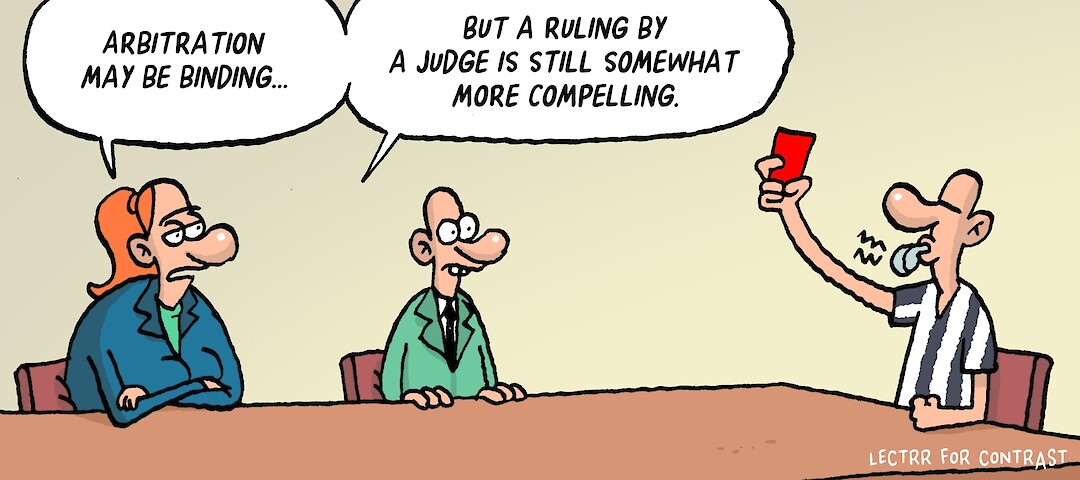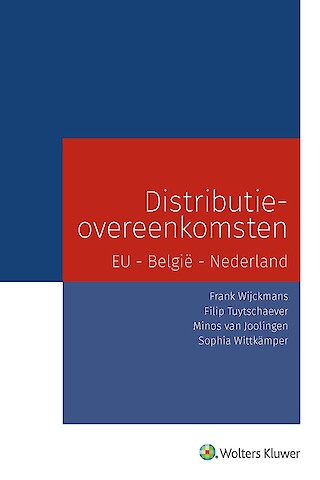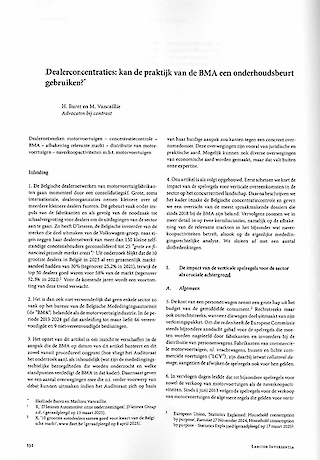In the Picture

Arbitration: final destination or simple stopover?
September 2025Imagine...
One of your business partners claims that your company is abusing its dominant position and threatens to go to court to stop that abuse and claim damages. An amicable solution proves impossible to reach.
To avoid a protracted legal battle before the courts, you propose that the dispute be settled through arbitration. The other party agrees, the arbitration proceedings run smoothly, and the outcome is positive: the arbitrators reject the alleged abuse of a dominant position.
You are relieved until you receive a message from your solicitor a few weeks later. Apparently, the other party does not accept the ruling and is still going to court. You frown. Is this possible? Wasn't arbitration final?
A brief clarification.
Arbitration is a form of alternative dispute resolution. The parties choose not to bring their dispute before the ordinary courts, but to have it settled by one or more arbitrators. This is possible if all parties involved agree to arbitration before or after the dispute arises.
The parties themselves determine where, under which law and in which language the proceedings will take place. They can organise the arbitration proceedings themselves or opt for proceedings within the framework of a recognised national arbitration institution or the International Chamber of Commerce.
Arbitration has other advantages too. Arbitrators are appointed based on their expertise, the proceedings can be confidential, and the arbitral award is enforceable in many countries thanks to the 1958 New York Convention. Arbitration is also faster than traditional legal proceedings, mainly because, in principle, there is no right of appeal, and the arbitral award is final.
Some nuance is required for the latter. The final nature of arbitral awards is not absolute. Under national law, parties can generally bring an action before the ordinary courts to set aside a final arbitral award to verify whether public policy rules have been complied with. These rules include competition law.
In this context, the recent judgment of the Court of Justice of the EU in the RFC Seraing case is also interesting. This case concerned sanctions imposed by the World Football Association (FIFA) on the Belgian football club RFC Seraing for violations of the FIFA statutes.
RFC Seraing challenged these sanctions before the Court of Arbitration for Sport (CAS) in Lausanne, Switzerland, and subsequently before the Swiss Supreme Court, both of which upheld the sanctions imposed.
At the same time, RFC Seraing also initiated proceedings before the Belgian courts. The club argued that the relevant provisions of the FIFA statutes constituted a violation of European competition law. The Belgian courts initially declared themselves incompetent on the grounds of the final nature of the CAS arbitration award. The case eventually reached the Court of Justice of the EU via a request for preliminary ruling.
The Court ruled that arbitral awards concerning disputes relating to activities within the EU must be capable of being reviewed against the rules of European public policy. These are fundamental rules such as competition law or the free movement of workers, services and capital.
To ensure the correct application of those rules of European public policy, the parties concerned must always have access to a national court of an EU Member State that can refer questions to the Court of Justice of the EU for a preliminary ruling. Rules of Member States – and of sports associations – that make such review impossible must be set aside.
The Belgian court could not therefore reject RFC Seraing's claims solely on the grounds of the final nature of the CAS arbitration award. Neither the CAS nor the Swiss Supreme Court can refer questions for a preliminary ruling to the Court of Justice. RFC Seraing must therefore have access to a national court of an EU Member State (in this case Belgium) that can do so. That national court must be able to review the arbitral award against the rules of European public policy, including competition law.
Although the judgment focuses on sports arbitration by the CAS, the considerations are more broadly applicable. The Court emphasises that arbitration must not be used (abused) to circumvent rules of European public policy.
Concretely.
- Arbitration is a useful alternative to traditional legal proceedings. It offers flexibility, expertise, confidentiality, international enforceability and speed.
- An arbitral award is in principle final, but national legislation usually provides that parties can bring an action for annulment before the courts. In such a case, the court does not carry out a completely new assessment but checks whether the rules of public policy and the requirements of due process have been complied with.
- The Court of Justice of the EU confirms that an arbitral award must be able to be reviewed by a court of an EU Member State against the rules of European public policy, including competition law.
- The underlying idea is that arbitration should not be used to circumvent fundamental rights. Judges thus remain the gatekeepers of fair dispute resolution and compliance with public policy rules.
Want to know more?
Please consult our website or contact one of our team members if you have questions or require more information:













